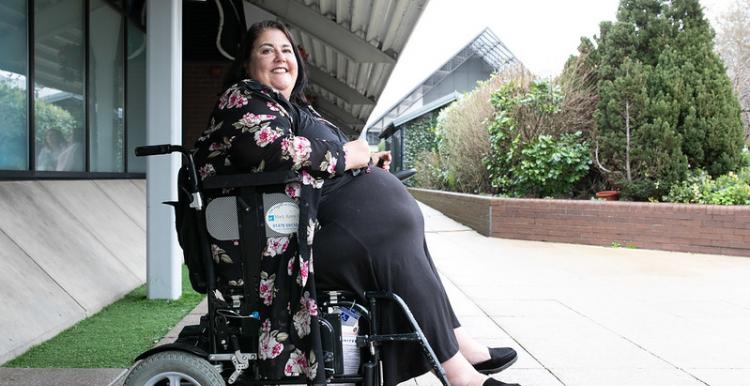Making life easier: Improving access to wheelchairs and mobility equipment

Over 700,000 people are registered to get NHS-funded wheelchair services.1 This support, along with equipment and home adaptations provided by councils, aims to help improve the quality of life for disabled people.
We have looked at a sample of stories people have told us about their experiences of these services to identify the issues that can prevent them from getting the support they need to live as independently as possible.
In brief: What should services focus on?
People’s experiences point to several areas that wheelchair and equipment services can focus on to make sure they are providing the best service:
- Information: Make sure that information about what help is available is easy to access and clear.
- Waiting times: Set out and meet clear response and waiting times.
- Getting the right equipment: Doing a thorough assessment helps make sure the correct wheelchair and equipment is given the first time.
- Responding to changing needs: People can struggle when their needs are not evaluated on a more regular basis.
Exploring what have people told us
We reviewed 226 stories people shared with their local Healthwatch alongside other evidence to see what services can learn from these experiences.
Over three-quarters of the feedback we have received for wheelchair services is negative in sentiment,2 and our evidence suggests that disabled people who need equipment don’t always know where to get help.
“We saw a lady who is having difficulty using the steps to get into her house. Someone has mentioned that she may be eligible to get a ramp put in, but she does not know how to access this.”
Long waiting times for assessments, provision of equipment and repairs
Being given the correct equipment in a short time frame is very important for disabled people to maintain their independence.
Personal story:
“People don’t understand what the service means to elderly people that are not as mobile as we once were. Without this service I’d have a lot of problems in my day-to-day life.”
Story shared with Healthwatch Suffolk
The NHS requires wheelchair service providers to supply all adults and 92% of children with wheelchairs within 18 weeks of referral, but the latest NHS statistics show that these targets are not being met.3 There is no equivalent published data or targets for equipment services provided or commissioned by local councils.
A previous review about wheelchair services for NHS England in 2017 acknowledged that there were unacceptable delays for disabled people in waiting for a wheelchair.4 They found that:
- 70% of wheelchair users wait more than three months for their chair
- 30% wait more than six months
- 15% wait more than 12 months
"[A man with] Muscular Dystrophy was referred to wheelchair services in August 2018 and had an assessment in April 2019. He was told that he could have a basic wheelchair … if anything changed he would need a reassessment. He was initially quoted an 8-10 weeks wait, but after that, he started to call for an update once a month. He was initially told that it was being dealt with and that he should not have been given a time scale. Finally, he was sent an appointment for 25 October 2019 – 14 months after his initial referral."
Story shared with Healthwatch Kent
The stories people have shared with Healthwatch reflect NHS data when it comes to waiting times. People have also told us that they can wait a long time to get equipment serviced, adjusted or repaired. If the equipment can’t be fixed quickly, people can be left with poor quality of life.
Personal story:
A woman contacted us about her disabled mother who had been living in an armchair for three weeks. The stairlift that had been put in by the council had broken and they were refusing to fix it. The council said that the mother should move her bedroom to the front room which the daughter felt was wholly impractical for her mother’s quality of life.
Story shared with Healthwatch Warwickshire
What people want is a responsive and swift service at the right time, which can only happen if commissioners of services are monitoring whether this is happening. A focus on responding quickly can make a big difference to people’s quality of life.
“My daughter is a wheelchair user. She was fully assessed after the new provider won the contract… We were very impressed by the facilities and staff at the assessment centre… The brand-new chair was delivered very soon after the assessment. Since then we have needed the chair to be serviced and repaired… There have been some admin mix-ups, but we have never waited too long and the various technicians who have attended at our home have been polite and efficient. They often have with them necessary parts or if not order them and return a few days later to fit them.”
Story shared with Healthwatch Kent
The review undertaken for NHS England in 2017 about wheelchair services estimated the scale and cost of ill-fitting wheelchairs:5
- Up to 100,000 wheelchair users will develop pressure ulcers from being given the wrong chair.
- Up to 50% of all wheelchair users will develop a pressure ulcer at some point in their life.
- The cost of treating a ‘full-thickness sacral sore’ will cost as much as 16 hip replacements.
As well as affecting the health of individuals, these statistics show the extra costs for the NHS when unsuitable wheelchairs are given to people.
Personal story:
“I want to complain about [the wheelchair services provider]. They have refused to see my daughter who is 9 and a half and needs adjustments to the growth kit on her wheelchair as she has unsurprisingly grown since they last did it in July 2018! Her NHS Occupational Therapist also said she has outgrown the backrest. I asked for an appointment two weeks ago and was asked to send a photo of her in the chair. They phoned today to say they won't see her to assess and not to contact them again until she has outgrown the chair fully. When I questioned how long we would then wait they said up to 16 weeks from there. I am not prepared for another fight like last year when it took 8 months for them to make the adjustments and I was forced to buy a chair whilst we waited.
Story shared with Healthwatch Kent.
When left with no option but to use an unsuitable wheelchair, people have told us this can result in pain, discomfort, poor posture and unnecessary injury.
The wider context: More personalised joined-up support
A legal right to a Personal Health Budget
The NHS Long Term Plan aims to give people more choice and control over their care and Personal Health Budgets are being offered to support this aim.
Since December 2019, everyone eligible for an NHS wheelchair has had a legal right to a personal wheelchair budget. With a personal wheelchair budget, wheelchair users work with services to ensure their wheelchair is right for them and supports all their mobility needs. People know how much money they can spend on their wheelchair and are given a high degree of flexibility and choice in how to spend it, including an option to purchase a wheelchair from an independent provider.
Personal budgets aim to shift away from only focussing on a person’s clinical needs, and towards providing the support that also thinks about someone’s strengths, skills, social context and personal needs.
If rolled out effectively, personal wheelchair budgets offer an opportunity to make sure people have the right wheelchair for their needs, but the NHS must continue to listen to people to ensure personal health budgets are improving people’s experiences.
The right to have your needs reassessed
Local councils are responsible for assessing people’s needs for home equipment and making adaptations which make it safer and easier for people to do everyday tasks. Councils are also required to pay for any adaptations that cost less than £1,000, with additional grants available for more expensive adaptations.
But receiving the right home adaptations or equipment depends on an accurate and timely assessment of people’s needs. Once a care and support plan has been agreed, people have a right to ask for a review at any time if they think their needs have changed.
Even if people don’t request a review, the local authority is expected to review care and support plans once a year. However, our research has found that in many cases these regular reviews are not happening and we have called on councils to do more to make sure people get the yearly care reviews to which they are entitled.
The promise of more joined-up care
Council care assessments are also not always integrated with NHS funded wheelchair services, meaning that issues which could be better resolved by providing bespoke wheelchair equipment are sometimes tackled through home adjustments, and vice versa.
For example, in describing the potential benefits of personal wheelchair budgets, NHS England shares how one person’s assessment for home equipment resulted in a recommendation for kitchen adjustments. However, what he needed was a wheelchair with functions that allowed him to use the kitchen.
The roll-out of personal wheelchair budgets means that equipment assessments should now take better account of people’s wider care needs to achieve their health and wellbeing outcomes. More broadly, integrated personal budgets which cover both health and social care needs offer the promise of more person-centred care which gives people more control over all aspects of their lives.
References
1 Currently 647,600 adults and 65,053 children are registered to receive NHS-funded wheelchair services. National Wheelchair Collection Results, July – September 2019, NHS England.
2 Since January 2019.
3 According to NHSE’s latest data, 86.3% of adults and 84% of children whose episode of care was closed during the reporting period were supplied within 18 weeks of referral. National Wheelchair Data Collection, Q2 2019/20.
4 “Right chair, right time, right now”, NHS Improving Quality, 2017.
5 “Right chair, right time, right now”, NHS Improving Quality, 2017.


